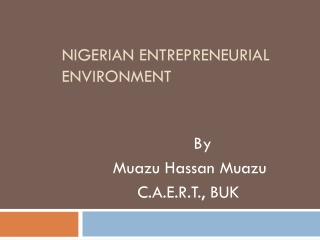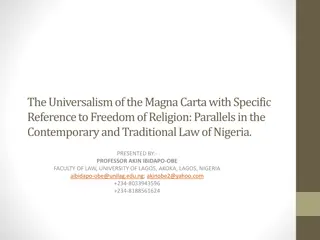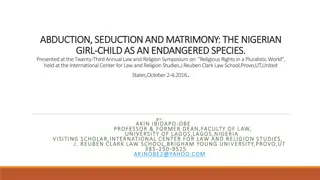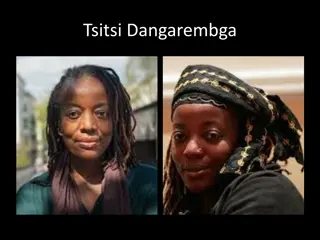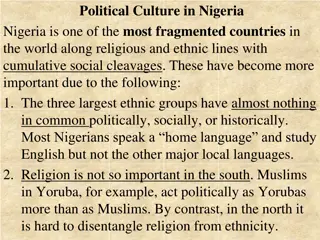Impact of Colonialism on Nigerian Politics
Colonialism played a significant role in shaping Nigeria as a state, with colonialists merging independent communities to form the nation. The political systems introduced by colonial powers were exploitative, focused on maximizing returns for the colonizers rather than serving the needs of the African people. This governance by conquest led to the overthrow of indigenous authorities and the annexation of territories like Lagos, establishing a system of rule through brute force.
Download Presentation

Please find below an Image/Link to download the presentation.
The content on the website is provided AS IS for your information and personal use only. It may not be sold, licensed, or shared on other websites without obtaining consent from the author.If you encounter any issues during the download, it is possible that the publisher has removed the file from their server.
You are allowed to download the files provided on this website for personal or commercial use, subject to the condition that they are used lawfully. All files are the property of their respective owners.
The content on the website is provided AS IS for your information and personal use only. It may not be sold, licensed, or shared on other websites without obtaining consent from the author.
E N D
Presentation Transcript
Constitutions under the Colonial Era: 1914 Constitution; Clifford s Constitution, 1922; Richard s 1946 Constitution, MacPherson s Constitution of 1951; 1954 s Lyttleton s Constitution
A Few Comments about Colonialism and Nigeria The formation of what Nigeria is today can be traced to colonialism. It is important to examine what colonialism is and its agenda was. as Ekeh (1975:93) says it is to colonialism that we must look for any valid conceptualisation of the unique nature of African politics. Osaghae (2006:234) reiterates this position. To him, the character contemporary African politics takes root from, and has been shaped by, colonialism. and pathologies of
there would have been no Nigeria as a state if colonialists had not merged together erstwhile independent communities and named it Nigeria. It is the colonialists that gave birth to Nigeria, formed its institutions, set its bureaucracies in place, decided the rules with which Nigeria is to be administered and determined the mode of governance with which the country is to be governed.
The kind of politics the colonialists introduced to Africa was quite different from the kind obtained in their home countries. Largely, the type of politics the colonialists practised back home was responsive to the needs of their people and geared towards improving the lot of their citizens. But the type they introduced to Africa was exploitative and directed towards expropriating the human and natural wealth of the African continent. Politics in the colonial era was aimed, strictly, at the maximisation of returns from the colonised states for the advantage of the colonisers.
the prime motive for the establishment of colonies was economic and in order to realise their economic goals, the colonialists employed means that are immoral in achieving the ends they sought.
Another thing that may be said of colonialism is that it was governance by conquest. As such was meant for subjects and not citizens. It, like military rule, is done through the instrumentality of brute force. Because it is governance over subjects, obedience must be commanded and not earned. The manner in which colonialism came to be established reflects this. This was through overthrowing of legitimate indigenous authorities. This led to the annexation of Lagos in 1851, and the making of Lagos the Crown Colony.
Colonialism was based on a divided and rule legacy. A manifestation of this is that people were played against each other and this shows in the way the educated elite were played rulers. In some way, colonialism disregarded tradition. This is obvious in the colonial leaders were appointing traditional chiefs. against the indigenous
Key Dates in Colonialism The annexation of Lagos took place in 1861 1900, the British formally took over the administration of Nigeria: The Crown Colony and Protectorate of Lagos; Protectorate of Southern Nigeria; and Protectorate of Northern Nigeria 1906, the merging of Crown Colony and Protectorate of Lagos and the Protectorate of Southern Nigeria. 1914, Amalgamation of Lagos Crown Colony, Southern Protectorate with Northern Protectorate
Note that the amalgamation was pursued because 1. the British government had no interest in using its wealth to pursue the administration of the emerging country; 2. as such the wealth of a part ( the south) had to be used for all. Lord Lugard argued that a merger of the two protectorate will lead to a more stable administrative structure which will be less demanding on the home government
The First Attempt at Constitution-Making- The 1914 Constitution Under the British, the constitution was enacted by order in council. There was the amalgamation of the Lagos Crown Colony with Protectorate of Southern Nigeria and Northern Nigeria.
Before 1914 the North and South were each divided into provinces for administrative convenience. The present day Western Nigeria, and the then Northern region followed a pattern of provincial boundaries that had existed before their inception in Nigeria. However, in the East, artificial boundaries were created because in the East the indigenous and social organisation was most fragmentary. Each province under the control of a British resident, with other administrative officers (District Officers and Assistant District Officers) below him in charge of subdivisions of the province; all officials were responsible to the chief executive of the territory.
Nigeria was administered under the British Monarch through her appointed agent, which is the Governor- General, with Lord Lugard being the first Governor-General There was the creation of a Legislative Council. This Legislative Council only had power to make laws for Lagos only. The Governor-General had the responsibility of making laws for the rest of the country. This constitution was operated for 8 years until 1922 when the Clifford Constitution came into force.
Cliffords Constitution of 1922 Sir Hugh Clifford became Governor in 1922 and in response to political agitations in Nigeria and some West African Countries had to carry out some political reforms which gave room for more participation in the governance of the state in the legislative council. However, although there was the attempt to ensure more representation at the legislative level, there was not such a thing at the executive level. The situation that obtains is that all executive members remain British.
As a colonial governor he reported to the Secretary of State to the colony who happens to be a cabinet member of the British parliament. This goes to reinforce the claim earlier made in this course that colonialism ensured that responsible to the people of the colony but to the colonial masters. governance was not
A major plus of the Cliffords constitution is the introduction of the election principle to Nigeria. This led to the election of four person with three representing Lagos and one representing Calabar. This is inn response to certain agitation at the local level for representation. This agitation is borne out of the exposure of certain Nigerians to western education. It is also as a result of pressure from other African countries who were already agitating for against colonialism and more inclusion
However, while the Clifford constitution may be praised for introducing the elective principle into the Nigerians constitution for the first time, the nature of the franchise is that of limited franchise. This constitution restricted the eligibility of voters to the ability to earn 100 pounds. The implication was the disenfranchising of many Nigerians. Thus, in line with the philosophy underpinning colonialism, many people had no say in the governance of the country. You may add to this the fact that other areas of the country do not even have this opportunity that was extended to Lagos and to Calabar.
There was an expansion of the legislative council from 36 members, which was what obtained during the time of Lord Luggard members comprises of members; nine African unofficial members, three elected representatives from Lagos; one elected representative for Calabar. However, the legislative council was responsible for the making of laws for the south to 46 members. The 46 twenty-seven official
The Northern part continued to be ruled by proclamation from the governor. This buttress the divide and rule policies of the colonial administration with separate laws for the south and a different set of approach to the north. The legacy of such style of governance is still obvious today. The north continue to have a life of its own in the country, and lags behind in development, education and lifestyle
The governor exercises veto power over the laws made by the legislative arm. And a lot of time, the British Government, whom the governor is responsible to, could give directives to the governor as to what to do in relation to a law made by the governor. This show the extent to which the people had freedom over their own political destiny. The truth of the matter is that the people had little or no say in their governance
The Clifford Constitution provides for a situation in which there were unofficial members. These unofficial members were to hold their seat for five years and this was renewable for another five years. This kind of representation, in which there were unofficial members indicate that the loyalty of these people will be to the governor and not to the people of Nigeria for he who pays the piper dictates the tune.
Such an arrangement in the legislative council in which there were more unelected Nigerians in the legislative council is self-defeatist. This is so because the truth of the matter is that as there are normally cases of votes to decide issues, Nigerian voice on issues cannot be heard for there are more on the side of the British than on the side of Nigerian. May we also note that this kind of arrangement ensured the interference of the executive in matters bordering on legislative decisions. The import of this into Nigeria s politics is obvious as the executive arm of government, in a post-colonial Africa, continue to
Further buttressing the interference of the executive and the British legislative business is the fact that the governor could suspend with the approval of the British government, any member of the legislature. However, whereas the member of the legislature were meant to be able to carry on their duties without fear or favour, this was not the case government in
A major effect of this constitution is the expression of greater nationalism on the part of Nigerians. As would be seen, there was the battle for constitutional reforms as people asks for more representation in the legislative council
The constitution was instrumental in permitting the introduction of political parties. This led to the formation of Nigerian National Democratic Party (NNDP) of Herbert Macaulay in 1923. This party was formed in order to serve as a platform for contesting elections which the Clifford constitution made provision for. The party won all the seats in the elections of 1923, 1928, and 1933.
Richards 1946 Constitution After the exist of Sir Hugh Clifford, Donald Cameron and Sir Bernard Bourdillon ruled Nigeria. These two did not do much in terms of further developing the constitution. However, Boudillon, for administrative purposes divided up Nigeria into the North, East and West thereby introducing regionalism into Nigeria s politics
It is important to reiterate that the making of the constitution during the colonial era was to some extent responsive to the yearnings of people of Nigeria. To buttress this is the fact that the Richard s Constitution was in response to some complaints about Clifford s 1922 Constitution. Colonial era constitution was also to some extent responsive to the need to shape local politics because in actual fact there were dynamics that shaped events as a result of how people who were formerly free were relating to each other and the tension this was creating. Events also over time revealed the need to manage the differences among the different parts of the country.
In some way the 1946 Richards Constitution aims at responding to yearnings from Nigerians and to address certain issues peculiar to the evolving a Nigerian nation which cooperation of all Nigerians. Son the Richard s Constitution is enacted to promote unity in Nigeria and to ensure greater participation of Nigerians in the discussion of their own affairs. This constitution came into effect on January 1, 1947. gets patriotism and
A major feature of the 1946 constitution is that it introduced regionalism into the country. This is obviously done out of the need to have the peculiarity of different sections of the country managed differently. The predominantly north, the east with stateless structure and the west with some state structures. Note also that these different regions had different cultures, some of which are conflict and need to be manage. In addition, the introduction of regionalism into the country will help the different regions to manage their development and peculiarities
The three regions were allowed to have legislature. There was a central legislative council of 45 members; In the attempt to manage the differences between different parts of the country there was the creation of a legislature that will help manage certain peculiarity. The northern part of the country, was given a bicameral legislature- House of Assembly and House of Chiefs. The Houses in the Western and Eastern parts were to have unicameral legislatures
A major improvement on the structure and duty of the legislature is that the Central Legislative Council was to legislate for the whole country. This was in contrast to the previous arrangement in which the legislative council did not legislate for the north. The regional houses had no independent legislative power. A law concerning a particular region was sent to the legislature of that region from the Legislative Council in Lagos, for consideration and advice. The Governor could reject the advice of the regional legislature.
The Constitution retained the veto power of the governor. The Governor had reserved powers to act if the Legislative Council refused what he proposed to do. The Secretary of State for the Colonies approves such proposals Governor. must however, of the
The elective principle which was in the 1922 constitution was retained. One, only Calabar and Lagos could still vote. Two, there was the reduction of the level of income one must have before one could vote. So there was the reduction from 100 Pounds to 50 Pounds. This shows that there was the retention of certain discriminatory principles against those who were being rules. It also shows that the pressure being mounted was useful in getting the British to respond to local requirements.
In addition, the executive council was expanded to accommodate Nigerians. This was so for the first time. So, Sir Adeyemi Alakija and Bankole Rhodes
Merits of Richard constitution of 1946 Merits of Richard constitution of 1946 It was an improvement of Clifford constitution of 1922 Greater consideration was given to Nigerian opinion in the making of laws than under the 1922 Constitution. It gave the division of the country into East, North and West the force of Law. The Federal idea was the most popular feature.
Demerits of Richard constitution of 1946 Demerits of Richard constitution of 1946 The constitution failed by not giving Nigerians responsibility in the actual administration of their country The governor still retained his veto powers thereby making a mockery of the legislative council. The elective principle was still as restrictive as under the 1922 constitution. There was widespread dissatisfaction with the constitution which led to its collapse in 1949. The right to vote was limited to people with high income or property. European interests were still represented in the Legislative Council. The constitution was promulgated with the least possible consultation with the Nigerian people.
MacPhersons Constitution of 1951 Sir John Macpherson, whom this constitution is named after, took over from Sir Arthur Richard, as Governor of Nigeria in 1949. This constitution came to be because the elites and educated indigenous Nigerian leaders agitated for increased autonomy for the regions with the aim of enabling Nigerians to take over the governance of their country. The Richard s Constitution was to last for nine years, but as a result of the criticisms levelled against it, it was replaced in 1951. Herbert Macaulay and Nnamdi Azikwe travelled to important towns in the country to educate people on the issues at stake and to collect donations with which protest will be sent to London.
In order to allow for wide input from Nigerians, three years (1948- 1951) were given to gather Nigeria s opinion on the what Nigerians wanted at the district, provincial and regional levels.
Main Features of Macpherson Constitution 1. The Establishment of a central unicameral legislature known as the House of Representative. Membership of this legislative house consists of those who were elected directly (for those representing Calabar and Lagos) and those who were elected indirectly from the regions, through the regional Houses of Assembly. 2. The Central Legislative Council is made up of i) the President; ii) Six Ex- Official members; iii) 136 representative members from the Regional Houses; iv) Six Special Members appointed by the Governor to represent certain interests not adequately represented in the House 3. The review of the franchise to accommodate 21 years and above as long as they pay tax and were resident in the region for at least 12 months, in order to be eligible to be voted for. The only exception was in the north where women could not be voted for
4. The office of the Lt. Governor was retained for the regions as chief executive and chief law giver. However, although the Lt. Governor in the region is the chief law maker, any bill passed into law by the regional houses must be approved by the Governor in Lagos before being accented by the Lt. Gov. 5. The constitution divided the country into three regions- Northern Region; Eastern Region; and Western Region. Each region has a regional legislature and regional executive council. Bicameral legislature operated in the north and in the south, while the east had a unicameral legislature. 6. In the North, as in the West, there was the House of Chiefs, in addition to the House of Assembly. The House of Chiefs is made of first class kings and other chiefs nominated by the Lt. Governor at his discretion. The Lt. Gov. presides over the House of Chiefs in both the Northern and Western Regions.
7. The Houses of Assembly in both the north and the east were presided over by the Lt. Gov. in each region, while in the West the House of Assembly is presided over by someone appointed by the Lt. Governor. 8. The central executive council has the Governor at the apex of the structure and he is empowered to make laws on behalf of the Her Majesty, the Queen. The governor is assisted by a council of ministers that are nominated from among the membership of the regional Houses of Assembly. However, the ministers have no specific portfolio. They are assigned responsibility at the discretion of the Governor. 9. The Governor could raise bills to be debated by the House of Representatives, but has the power to bring any bill into force as law if he considers it as being expedient to do so.
10. West Cameroun was directly administered by the Governor from Lagos through a Chief Commissioner that is resident in West Cameroun. 11. West Cameroun had no legislative house but has representation in the House of Representative through indirect election by Native Authorities in the territory.
Shortcoming of MacPhersons Constitution of 1951 A lot of the defects affecting other constitutions made under the colonial era affect this constitution. One, it is obvious that the people for whom the constitution is made do not have all the say as to how they should be governed. The colonialists still have restrictions as to what areas can be touched and what areas the people cannot not legislate over. Second, and flowing from the first, even in areas that the people have be given some freedom, it is obvious that the people do not have the final say as the Governor or the Lt. Governor has the right to override some decisions or laws
Third, there was no uniformity in the laws with which the country was administered. The peculiarities of the different regions of the country was backed by law. This has the unfortunate effect of accentuating the differences of the regions rather than seeking to bridge the gaps between the regions.
1954s Lyttletons Constitution No matter how desirable The MacPherson Constitution of 1951 was, it still fails to address all the problems associated with constitution and constitutionalism in Nigeria. It also failed to address all the issues relating to social and political problems emanating from Nigeria. This is principally so because the people were not free and do not have their social and political destinies in their hand. So the agitation for a free Nigeria continued to plague any constitution made. In order to address this, there is the need for political independence.
There were some failures of the Macpherson constitution which necessitated the need for a new constitution. Too much veto power was vested in the Governor and Lt. Gov who could without accent to the bill passed by the houses. This proves the position held in this course that because the constitution was made under the colonial masters there were certain limits that the constitution imposed which would not have been imposed if the people were free. Thus colonialism imposed its own nature on the constitution.
Another defect of the Macpherson constitution was that the powers of the regions were limited in making laws and there was limit to the autonomy it enjoyed. These defects necessitated the need for consultation with the people and another constitution The Lyttleton constitution moved a little closer to this. There were conferences held in London and in Lagos to address the agitations of Nigerians
The London Conference of 1953 The aim of the London Conference is to discuss the constitutional and governance structures of Nigeria. This conference was held between 30th July and August 22, 1953. The London Conference which was held in Lancaster House, London had in attendance four (4) delegates from the regions. At the Conference, the need for the regions to have autonomy from the centre was emphasized and agreed on. The centre is to handle such functions as Defence, External Relations, Foreign Trade, Water Control, Central Court of Justice among others.
Nigeria is to become a federal system of government with two legislative lists- exclusive list and concurrent list. The conference agreed to a concurrent list shared by the centre and the regions. The concurrent list contains: higher education, industrial development, power, insurance etc. The regional head, the Lt. Governor is to be know as the Governor, while the central governor, the Governor, is to be called the Governor-General. In the case of any conflict between federal law and regional law, the federal law is to prevail.
Lagos is to become a federal capital territory. Another decision taken had to do with regional autonomy. Regions who are ready for it will have internal self-government by the 1956.
1954 Lagos Conference There were key issues that could not be agreed on during the 1953 London Conference. This necessitated a follow-up conference in Lagos in 1954. This conference took place in January, 1954 under the Chairmanship of the Secretary to the State for the Colonies, Mr. Oliver Lyttleton. The following are some of the highlights of that conference. 1. That the system of governance in Nigeria should be federalism. 2. Public service should be regionalised 3. Federal government should fund the regions fro centrally collected revenue. 4. Organisation of election on the basis of political party




